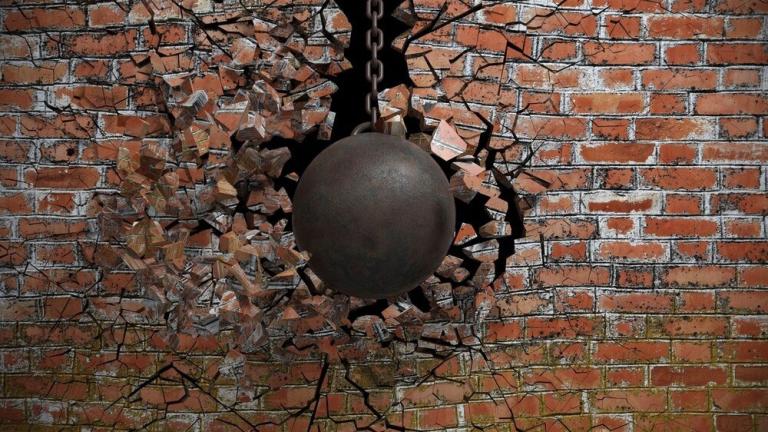
Public critiques from evangelicals regarding deconstruction are on the rise over the last few years. Do you ever wonder why? I mean, what could be the harm in thinking critically about matters of faith? Wouldn’t any denomination or church movement encourage such thinking as a means for people to grow in their faith? In this article, I will provide two reasons why evangelicals hate deconstruction and why they continue to call it “dangerous”.
What is deconstruction/reconstruction?
First, it’s important to understand what it means for someone to “deconstruct” their faith. To be clear, religious deconstruction is not the same thing as philosophical deconstruction (which was espoused by postmodern philosopher Jacques Derrida.) Religious deconstruction is the tearing down of theological presuppositions and beliefs in order to reconstruct beliefs under a new paradigm. That new paradigm does not have to be a different denomination or religion, but it often results in a significant change.
Usually, doubt is the catalyst that demonstrates the need for deconstruction. Therefore, all deconstruction is built upon the foundation of doubt. This is an important idea for people who experience doubt to understand. Doubt is healthy and doesn’t necessarily lead to a weakening of one’s faith. There are many people in evangelicalism who begin to doubt and become atheists as a result. This is largely because evangelicalism discourages doubt when they should see it as an opportunity. Instead of becoming an atheist, which is a huge leap from doubt, the individual should consider going through a journey of deconstruction. Deconstruction is the only way that harmful beliefs can be dealt with religiously. However, deconstruction cannot happen in isolation. It must be followed by reconstruction.
Oftentimes missing from the critique that evangelicals raise about deconstruction is the reconstruction journey that often follows. Reconstruction is the rebuilding of religious beliefs upon the new paradigm that the individual has established. Reconstruction allows the individual to find their own beliefs instead of what has been spoon-fed to them most of their religious life. The fact that reconstruction is rarely, if ever, mentioned in evangelical conversations bolsters the fact that they fail to understand the basic concepts of deconstruction on the whole.
Why do evangelicals oppose deconstruction?
There are two primary reasons why evangelicals hate the idea of deconstruction. The first is simply because progressive Christians promote it. Evangelicals are not quick to espouse any idea that progressives offer to the religious conversation. Moreover, evangelicals will always be the foil to progressive Christian ideals no matter how beneficial or true the idea is.
This is very childish reasoning, but not that unexpected since many have the same juvenile attitude in politics. Politicians are slow – if not completely averse – to agree with someone from the opposite party. For some reason, they believe it makes them look weak when in reality it makes them look informed.
The second reason evangelicals oppose the practice of deconstruction is that it oftentimes involves evangelicals who are starting to doubt the shaky foundation their theology is built upon. Most people deconstructing are evangelicals and that looks bad. Deconstruction demonstrates the extent to which evangelicals have got it wrong. It points back to them and screams “there is something wrong here!”
Moreover, when it is all said and done, many leave evangelicalism for a more rational affiliation – either mainline or progressive forms of Christianity. For whatever reason, there is a lack of trust between evangelical leaders and their parishioners. Why wouldn’t evangelical leaders trust that their people would maintain their affiliation after reconstruction? I believe it is because they know that reconstruction will never lead to evangelicalism. I think they understand that evangelicalism has certain beliefs that require faith and cannot be understood by reasoning alone. An example of this is the doctrine of inerrancy.
Evangelicalism has seen sharp decreases in church attendance for many years and they must provide an excuse for this decline. Evangelicals would rather point to progressive Christianity as the culprit than admit that they might have a problem within evangelicalism.
Evangelicals position progressive Christians as stealing their people through worldly intrigue when really it was individuals learning to critically think about their faith that results in awareness than evangelicalism is not godly. Progressive Christianity is often viewed as a fad that doesn’t have staying power. Yet the number of people claiming to be progressive Christians continues to increase.
Deconstruction or Reform
I only want to briefly mention this because it is being talked about quite a bit in my social media feeds. I recently read an article by Tish Harrison Warren titled “The Church Needs Reformation, Not Deconstruction: A short guide to the exvangelical movement”. Ms. Warren greatly misunderstands the nature of deconstruction as a mechanism for destroying the Church. She instead posits that reform is the way of holding the Church accountable to truth. However, comparing deconstruction and reform is like comparing apples and oranges. Their functions are widely divergent – though they can be related at times, they are not similar. She claims that the people of the past who sought reformation never deconstructed their faith. She continues to state that deconstruction is simply a fad that ultimately damages the Church.
I should say at the outset that Ms. Warren misunderstands deconstruction, history, or both. Just because the term “deconstruction” is not mentioned in historical records doesn’t mean that it didn’t occur. In fact, the catalyst for both Luther and Calvin’s “reformations” was their own deconstruction journeys. Luther, for example, went back through scripture and could find no justification for indulgences (among other things) and out of this deconstruction eventually emerged a reformation. Calvin then deconstructed Luther and the faith to combat the Anabaptists movement. Further down the road came what is commonly known as Calvinism. In fact, Calvin’s work “The Institutes of the Christian Religion” showcases his theological reconstruction.
I think Ms. Warren believes that all deconstruction takes place across the entire faith. This is inaccurate. Ideally, an individual would deconstruct their entire faith, however, it often begins with a single theological idea that they doubt, and as they begin to reconsider certain things, it naturally snowballs into other areas.
Deconstruction is a lot more common than Ms. Warren realizes. For example, religious colleges oftentimes (when they are operating correctly) foster an environment of deconstruction (albeit a limited one) for individuals. For example, I went to a Baptist college as a Baptist, graduated from there as a Reformed Calvinist, and eventually became a progressive. This demonstrates the layers of deconstruction that occurred in my life. This is not true of everyone, sometimes people go to specific colleges to become more informed within their current worldview. This is called indoctrination. However, ultimately liberal arts colleges are supposed to teach individuals critical thinking skills that they can take with them throughout life.
What most people who are affiliated with denominations fail to realize is that no one denomination has all “the truth”. They each have bits of it. This is why critical thinking is so important. It gives the individual permission to seek out the truth that is being proclaimed throughout the vast network that is Christianity.
Some Concluding Thoughts
There is nothing inherently wrong with deconstruction. It is a process that I would recommend to anyone who wants to develop critical thinking and have faith that is their own and not something that was simply handed to them. Those who deconstruct often find a new sense of enlightenment (no pun intended) that may result in some grief over the faith they knew, but that ultimately grows into excitement about the process.
However, I wouldn’t be honest if I didn’t tell mention that this process is hard and can be lonely at times. Therefore, I always encourage people going through the deconstruction journey to do it with someone they trust. Someone who might act as a spiritual mentor for them through the process. My friend and fellow Patheos contributor Keith Giles offer’s mentoring services for those going through deconstruction, which I highly recommend. He has been gracious enough to provide UNenlightenment with a significant discount link for his services. If you or someone you know would benefit from help navigating through the confusion of deconstruction, Keith can help people find their theological voice. Click this link to learn more.
You can view my UNenlightenment YouTube Channel HERE
You can view my UNenlightenment Podcast HERE
You can follow me on FaceBook HERE














